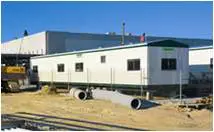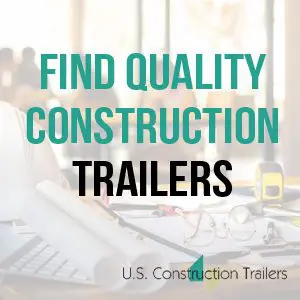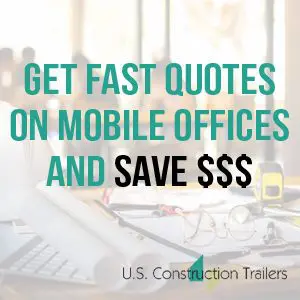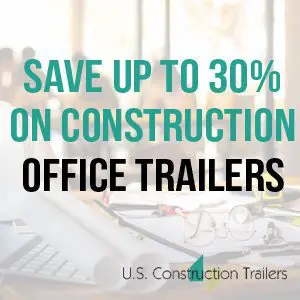
Avoid Costly Repairs: Inspect Before You Invest in a Used Office Trailer
Investing in a used office trailer can be a practical and cost-effective solution for businesses needing temporary or mobile workspace. However, purchasing a used trailer without proper inspection could lead to unexpected and costly repairs down the road. A thorough inspection helps ensure that the trailer is in good condition and fits your business’s needs without hidden expenses.
In this guide, we’ll explore the key areas to focus on during an inspection, common issues to watch out for, and tips on hiring professionals for specialized assessments. With the right knowledge and approach, you can avoid costly surprises and make a smart investment in your used office trailer.
Why Inspections are Crucial for Used Office Trailers
Office trailers experience heavy use and exposure to the elements, especially if they have served as construction site offices or temporary classrooms. Wear and tear can lead to damage that isn’t always immediately visible. Without an inspection, you could end up with costly repairs, safety hazards, or even structural issues that render the trailer unusable.
Inspecting a used trailer before buying gives you confidence in your purchase, ensures it’s fit for purpose, and allows you to negotiate a fair price if any minor repairs are required. It also helps you avoid making an impulse purchase that could quickly drain your budget on maintenance and upgrades.
What to Inspect Before Buying a Used Office Trailer
Conducting a thorough inspection involves looking at the trailer’s structure, exterior, interior, and utility systems. Below are the key areas to assess, along with specific issues to watch out for.
1. Exterior Structure and Frame
The exterior of the trailer is your first line of defense against weather and environmental damage. Inspecting the exterior structure carefully will reveal any visible signs of damage or weaknesses.
What to Check:
- Roof Condition: Look for cracks, leaks, or rust, especially around seams and vents.
- Walls and Siding: Check for dents, cracks, or missing panels.
- Doors and Windows: Ensure they open, close, and lock properly. Look for gaps or warping that could let in moisture.
- Underframe and Chassis: Inspect the frame for rust, corrosion, or bent components that could indicate structural issues.
Damage to the frame or roof can lead to costly repairs, so it’s essential to identify these issues early.

2. Interior Walls, Floors, and Ceiling
The interior should be functional and safe for use as a workspace. Even minor interior damage, if left unaddressed, can become a more significant problem.
What to Look For:
- Flooring: Check for soft spots or uneven areas that could indicate water damage or rotting.
- Walls and Ceiling: Look for stains, cracks, or mold, which could suggest past leaks or poor insulation.
- Electrical Outlets and Fixtures: Ensure outlets are working and light fixtures are securely installed.
Pay close attention to areas around windows and doors, as these are common points where water can enter. Any signs of moisture damage should raise red flags.
3. Plumbing and HVAC Systems
A well-functioning office trailer should have reliable plumbing and HVAC systems, especially if your employees will be spending long hours inside.
What to Inspect:
- Plumbing: Run faucets and flush toilets to check for leaks, low water pressure, or slow drainage.
- Water Heater: Ensure the water heater is functional and free of corrosion.
- HVAC System: Test the heating and cooling system to make sure it operates effectively. Check air filters and vents for cleanliness.
Repairing plumbing or HVAC systems can be expensive, so verifying their condition before purchase is essential.
4. Electrical System and Wiring
Electrical issues can lead to safety hazards if not addressed. Inspecting the wiring and electrical systems ensures everything is up to code and functioning correctly.
Key Areas to Check:
- Breaker Panel: Look for labels on the panel and ensure there are no signs of overheating.
- Wiring: Inspect for exposed or damaged wires, especially in older trailers.
- Outlets and Switches: Test every outlet and switch to confirm they are working properly.
If the trailer doesn’t meet current electrical standards, you may need to invest in upgrades to ensure safety and compliance.

Common Issues to Watch Out For
During your inspection, certain red flags can indicate potential problems that may require costly repairs.
- Rust and Corrosion: Rust on the frame or roof can compromise the trailer’s structural integrity.
- Water Damage: Stains, soft flooring, or mold growth point to leaks and moisture problems.
- Pest Infestation: Check for signs of pests such as rodent droppings, nests, or chewed wires.
- Poor Insulation: If the trailer has poor insulation, it could lead to higher energy costs.
- Unpermitted Modifications: Verify that any modifications meet building codes and regulations.
These issues should factor into your decision-making, either as points to negotiate a lower price or as deal-breakers depending on their severity.
Should You Hire a Professional Inspector?
While you can conduct a general inspection yourself, hiring a professional inspector ensures that nothing is overlooked. Inspectors with experience in trailers and mobile units can assess areas that require specialized knowledge, such as plumbing, HVAC, and electrical systems.
Benefits of Professional Inspections:
- Detailed Reports: Receive a comprehensive report that highlights any issues.
- Unbiased Opinion: Professionals provide objective assessments without emotional attachment to the purchase.
- Negotiating Power: Use the inspection report to negotiate repairs or a lower purchase price.
Hiring an inspector is a worthwhile investment, especially for high-value trailers. The cost of an inspection is minimal compared to the potential expenses of unexpected repairs.
What to Do if Repairs Are Needed
If the inspection reveals issues, you have a few options to address them before finalizing your purchase.
- Negotiate a Lower Price: Use the inspection report to negotiate a price reduction to cover the cost of repairs.
- Request Repairs: Ask the seller to fix any major issues before completing the sale.
- Walk Away: If the repairs are too extensive or costly, it may be best to explore other options.
Being prepared to act on the inspection results ensures you won’t be stuck with a trailer that becomes a financial burden.

How to Prepare for the Inspection Process
If you’re serious about buying a used office trailer, it’s essential to approach the inspection process with a plan.
Tips for a Smooth Inspection:
- Schedule Early: Book inspections early to avoid delays in your purchase timeline.
- Bring a Checklist: Use a detailed checklist to ensure you don’t miss anything.
- Take Photos: Document any damage or concerns with photos for reference.
- Ask Questions: Don’t hesitate to ask the seller for maintenance records or warranties.
Being thorough during the inspection will save you time, money, and stress in the long run.
Investing in a used office trailer can be a smart solution for businesses, but only if you take the time to inspect it thoroughly before purchase. By examining the trailer’s structure, interior, and utility systems, you can identify potential issues and avoid costly repairs. Hiring a professional inspector adds an extra layer of confidence, ensuring that every aspect of the trailer is in good condition.
Whether you plan to use the trailer as a workspace, storage unit, or temporary office, a proper inspection will help you make a sound investment. With careful planning, attention to detail, and proactive action, you can secure a reliable office trailer that meets your needs without breaking your budget.

Leave a Reply